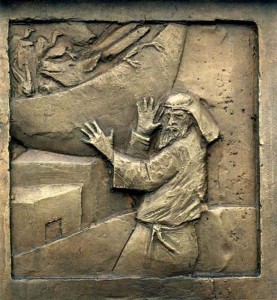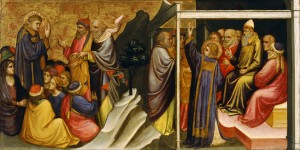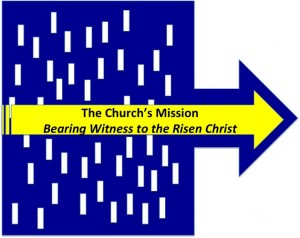1 At Caesarea there was a man named Cornelius, a centurion of what was known as the Italian Cohort, 2 a devout man who feared God with all his household, gave alms generously to the people, and prayed continually to God. 3 About the ninth hour of the day he saw clearly in a vision an angel of God come in and say to him, “Cornelius.” 4 And he stared at him in terror and said, “What is it, Lord?” And he said to him, “Your prayers and your alms have ascended as a memorial before God. 5 And now send men to Joppa and bring one Simon who is called Peter. 6 He is lodging with one Simon, a tanner, whose house is by the sea.” 7 When the angel who spoke to him had departed, he called two of his servants and a devout soldier from among those who attended him, 8 and having related everything to them, he sent them to Joppa. 9 The next day, as they were on their journey and approaching the city, Peter went up on the housetop about the sixth hour to pray. 10 And he became hungry and wanted something to eat, but while they were preparing it, he fell into a trance 11 and saw the heavens opened and something like a great sheet descending, being let down by its four corners upon the earth. 12 In it were all kinds of animals and reptiles and birds of the air. 13 And there came a voice to him: “Rise, Peter; kill and eat.” 14 But Peter said, “By no means, Lord; for I have never eaten anything that is common or unclean.” 15 And the voice came to him again a second time, “What God has made clean, do not call common.” 16 This happened three times, and the thing was taken up at once to heaven. 17 Now while Peter was inwardly perplexed as to what the vision that he had seen might mean, behold, the men who were sent by Cornelius, having made inquiry for Simon’s house, stood at the gate 18 and called out to ask whether Simon who was called Peter was lodging there. 19 And while Peter was pondering the vision, the Spirit said to him, “Behold, three men are looking for you. 20 Rise and go down and accompany them without hesitation, for I have sent them.” 21 And Peter went down to the men and said, “I am the one you are looking for. What is the reason for your coming?” 22 And they said, “Cornelius, a centurion, an upright and God-fearing man, who is well spoken of by the whole Jewish nation, was directed by a holy angel to send for you to come to his house and to hear what you have to say.” 23 So he invited them in to be his guests. The next day he rose and went away with them, and some of the brothers from Joppa accompanied him.
As we approach the tenth chapter of Acts, it will become clear to us that in the first ten chapters of the book we seek the advance of the gospel through the geographical parameters prescribed by Jesus for His Church in Acts 1:8.
But you will receive power when the Holy Spirit has come upon you, and you will be my witnesses in Jerusalem and in all Judea and Samaria, and to the end of the earth.
We have seen Jerusalem become “home base” for the Church with the coming of the Spirit at Pentecost and the initial proclamation of the gospel and beginnings of the mother church. We have seen it expand beyond Jerusalem to wider Judea and Samaria through the scattering of the believers as a result of the persecution following Stephen’s martyrdom. We witnessed Philip’s surprising and amazing missionary work in Samaria and then the coming of the Spirit upon the Samaritans when Peter and John arrived and prayed for the new converts. We saw hints of the further expansion of the gospel through the conversion of the Ethiopian Eunuch. And now, in the tenth chapter, we see the official beginnings of the spread of the gospel among the Gentiles.
We think of Paul as the great missionary to the Gentiles. This is an apt description, but let us recognize two truths: (1) Paul always started with the synagogues in his missionary work and (2) the gospel officially came to the Gentiles through the ministry of Peter, not Paul. This is helpful for it allows us to see that the Church was of one mind about the worldwide implications of the gospel.
This is not to say that there was not a maturation process that had to happen first. There certainly was, and we will see it in our text today. We are going to see in a microcosm the movement of Jewish believers towards Gentile believers and vice versa in the persons of Peter and a Gentile named Cornelius. We will approach this critical text with two truths in mind: the gospel promises outsiders that they are welcome to enter in through Christ and the gospel compels insiders to reach further out through Christ.
The gospel promises outsiders that they are welcome to enter in through Christ.
The first movement we will consider is the movement of those outside toward the gospel and the family of God.
1 At Caesarea there was a man named Cornelius, a centurion of what was known as the Italian Cohort, 2 a devout man who feared God with all his household, gave alms generously to the people, and prayed continually to God.
Clinton Arnold has provided some fascinating historical background on Roman centurions and on the type of man Cornelius likely was.
Cornelius may have been a descendant of one of the ten thousand slaves freed by the Roman general L. Cornelius Sulla Felix in 82 B.C. It is not uncommon for freedmen to take on the family name (gens) of their emancipator. On the other hand, “Cornelius” was a rather common Latin name.
He was a fairly wealthy man of status living in a beautiful city. Evidently he has been stationed in Caesarea for a long period of time because he possesses a home, his family is with him, and he has been there long enough to perform many generous deeds for the Jewish community.
“The financial attraction of the centurionate, however, was that the pay was probably some sixteen times that of the basic legionary salary”…The historian Polybius (1st cent. B.C.) says of centurions: “They wish centurions not so much to be venturesome and daredevil as natural leaders, of a steady and sedate spirit. They do not desire them so much to be men who will initiate attacks and open the battle, but men who will hold their ground when worsted and hard pressed and be ready to die at their post.”[1]
There is therefore some legitimate basis for us to think that Cornelius is a responsible person and a person who held the respect of his peers. Socially, he was obviously fairly well off, a person of some means. Luke also tells us that he was a godly man, a God fearer, a person with some knowledge of God who felt an accountability before God. Of course, he did not know the gospel, but he was looking. He prayed and he feared God and he led his family to do the same.
It is convicting to think that Cornelius did more with the partial light he had at this point than many who profess to know Christ do in terms of devotion and practice. How many who profess Christ fail to commit acts of charity and lead their households to the family altar. But Cornelius does precisely this. He is seeking God. Then, in God’s perfect timing, He moves to bring Cornelius further in.
3 About the ninth hour of the day he saw clearly in a vision an angel of God come in and say to him, “Cornelius.” 4 And he stared at him in terror and said, “What is it, Lord?” And he said to him, “Your prayers and your alms have ascended as a memorial before God. 5 And now send men to Joppa and bring one Simon who is called Peter. 6 He is lodging with one Simon, a tanner, whose house is by the sea.” 7 When the angel who spoke to him had departed, he called two of his servants and a devout soldier from among those who attended him, 8 and having related everything to them, he sent them to Joppa.
Here we see again the sovereign initiative of the God who loves the nations to open the door to those who previously were considered outside. An angel of the Lord comes to Cornelius and instructs him on how to get Peter in his home. Though he initially is fearfully, he trusts and he obeys and sends his men to Joppa to seek out Peter.
The significant point that must not be missed is that God comes to this outsider and invites him to a meeting in which not only his life and the life of his family will be forever altered, but the lives of the nations as well. Indeed, we should look at this episode with great interest, for Cornelius’ invitation is likewise our invitation. We are here, today, worshipping the Lord only because God in His mercy came to Cornelius. It is a humbling thought! The story of Cornelius is one about which we dare not be dispassionate, for his story is our story.
The gospel compels insiders to reach further out through Christ.
It should also not be missed that God instructs Cornelius to send men to bring Peter to him. Why is this significant? Because it was not enough for the Gentiles to move toward the gospel that these Jewish converts had. The Jewish converts likewise needed to move toward these Gentiles if the gospel was going to be what it was intended to be. So we see in our text a move towards one another on the parts of Peter and Cornelius, and, in seeing these, we are seeing the dissolution of a long-established barrier.
For this to happen, however, the Jews would have to learn to think differently. In fact, they would have to dare to believe the unbelievable: that the people they considered unclean were also welcome to come to Jesus and, in so doing, were as much a part of the family of God as they were.
9 The next day, as they were on their journey and approaching the city, Peter went up on the housetop about the sixth hour to pray. 10 And he became hungry and wanted something to eat, but while they were preparing it, he fell into a trance 11 and saw the heavens opened and something like a great sheet descending, being let down by its four corners upon the earth. 12 In it were all kinds of animals and reptiles and birds of the air. 13 And there came a voice to him: “Rise, Peter; kill and eat.” 14 But Peter said, “By no means, Lord; for I have never eaten anything that is common or unclean.”
You may think that you have had confusing dreams before, but I can assure you that none of your dreams have confused you the way that Peter’s vision confused him. He sees a sheet lowering, and on that sheet are animals that no pious Jew would dare eat for they were forbidden, unclean foods. In and of itself, the unclean animals on the sheet are merely disturbing and grotesque. What makes this utterly confounding are God’s instructions: “Rise, Peter; kill and eat.” In Peter’s mind, he cannot kill these animals because he could not even touch them! But the thought of eating them was outright repellant to him. We can see this in his reaction: “By no means, Lord!”
Poor Peter, in a state of confused piety, tells God no on the basis that God did not want him to do what God had just then commanded him to do! What a predicament! We dare not judge Peter too harshly. After all, how was this man who was raised as a Jew to all of a sudden think differently about an issue as fundamental as dietary laws and keeping kosher? If the Jews knew anything they knew that the physical sign of covenant membership was circumcision and one of the critical ongoing physical acts of obedience and belonging was keeping kosher and steering clear of forbidden foods.
Philip Yancey once tried to imagine a situation in our day that would rival the shock and outrage Peter must have felt at the divine instruction to kill and eat. What he came up with was the thought of a fully stocked bar being lowered at a Southern Baptist Convention gathering in Texas along with instructions that everybody was to come up to the bar and get a drink! That is a scandalous thought indeed, but even that pales in comparison to what Peter felt here.
God’s response to Peter’s outrage was crucial to Peter’s spiritual growth and willingness to take the gospel to the nations.
15 And the voice came to him again a second time, “What God has made clean, do not call common.” 16 This happened three times, and the thing was taken up at once to heaven.
Behold the beauty of the gospel: “What God has made clean, do not call common.” Now we begin to understand: this vision is not even primarily about food, it is about people. Peter will soon make this connection.
17 Now while Peter was inwardly perplexed as to what the vision that he had seen might mean, behold, the men who were sent by Cornelius, having made inquiry for Simon’s house, stood at the gate 18 and called out to ask whether Simon who was called Peter was lodging there. 19 And while Peter was pondering the vision, the Spirit said to him, “Behold, three men are looking for you. 20 Rise and go down and accompany them without hesitation, for I have sent them.” 21 And Peter went down to the men and said, “I am the one you are looking for. What is the reason for your coming?” 22 And they said, “Cornelius, a centurion, an upright and God-fearing man, who is well spoken of by the whole Jewish nation, was directed by a holy angel to send for you to come to his house and to hear what you have to say.” 23 So he invited them in to be his guests. The next day he rose and went away with them, and some of the brothers from Joppa accompanied him.
Here the truth begins to dawn on Peter through the association of two unlikely events: the unclean food lowered before him and an invitation from an unclean people standing before him. God is showing Peter that these people should not be considered unclean and should not be rejected. They are now welcomed in, and he, Peter, will be the initial human instrument through which God welcomes them.
How much Peter understood at this point is hard to guess, but clearly the truth of the matter was beginning to dawn on him. We know this because he receives the servants and the soldier sent by Cornelius and agrees to go with them. Peter’s going with the messengers represents an epic movement of the Jews and Gentiles toward one another through the new reality that Christ was making. Erasmus beautifully put it this way: Cornelius had “a glowing eagerness for the grace of the gospel” and Peter had “an alacrity and promptitude” as he “thirsted for the salvation of all races.”[2]
In the verses to follow we will see the exact content of Peter’s conversation with Cornelius and those within his house, but for our purposes at this point it is enough to note that the world-altering power of the gospel needed first to be acknowledged and released within the Church before it could be embraced by the world. God’s setting of the stage for this was amazing. He moved one who was outside further in. He compelled one who was inside to reach out. So it ever must be with the Church.
The Southern Baptist Convention was founded in 1845 at least in part to allow slave holding Baptists in the South to uphold the astounding notion that there was no fundamental disconnect between owning an African slave as property while simultaneously sending Christian missionaries to Africa to preach the gospel. This was an absurd idea, of course, and one that the Southern Baptist Convention has since formally acknowledged as wrong. Even so, it is sobering for us to realize that in our own history we have struggled to live out and embrace the full, radical implications of the gospel. We too have had to grow up and realize what it means for our view of God and man that Christ died on the cross and rose from the dead.
Indeed, it would seem that every group, every race, every people has another group, race, or people that they struggle to see as fully equal to themselves, as deserving of their sincerest efforts to bring into the family of God as co-heirs with Christ. The Church began with this struggle and it has continued with this struggle. But it is a struggle we must not abandoned. We dare not call common or unclean what God in Christ has called clean. We dare not treat as less than brothers and sisters those who, through Christ’s blood, are or can be our brothers and sisters!
In her book Out of the Saltshaker and Into the World, Rebecca Pippert shares a story that helpfully illustrates how one church had to likewise grow up in this area.
When I first came to Portland, Oregon, I met a student on one of the campuses where I worked. He was brilliant and looked like he was always pondering the esoteric. His hair was always mussy, and in the entire time I knew him, I never once saw him wear a pair of shoes. Rain, sleet or snow, Bill was always barefoot. While he was attending college, he had become a Christian.
At this time a well-dressed, middle-class church across the street from the campus wanted to develop more of a ministry to the students. They were not sure how to go about it, but they tried to make them feel welcome. One day Bill decided to worship there. He walked into this church, wearing his blue jeans, T-shirt and of course no shoes. People looked a bit uncomfortable, but no one said anything. So Bill began walking down the aisle looking for a seat. The church was quite crowded that Sunday, so as he got down to the front pew and realized that there were no seats, he just squatted on the carpet–perfectly acceptable behavior at a college fellowship, but perhaps unnerving for a church congregation. The tension in the air became so thick one could slice it.
Suddenly an elderly man began walking down the aisle toward the boy. Was he going to scold Bill? My friends who saw him approaching said they thought, you can’t blame him. He’d never guess Bill is a Christian. And his world is too distant from Bill’s to understand. You can’t blame him for what he’s going to do.
As the man kept walking slowly down the aisle, the church became utterly silent, all eyes were focused on him, you could not hear anyone breathe. When the man reached Bill, with some difficulty he lowered himself and sat down next to him on the carpet. He and Bill worshiped together on the floor that Sunday. I was told there was not a dry eye in the congregation.
The irony is that probably the only one who failed to see how great the giving had been that Sunday was Bill. But grace is always that way. It gives without the receiver realizing how great the gift really is.
As this man walked alongside of his brother and loved him with all that he had received from Christ’s love, so must we. This man was the good Samaritan. He made Bill feel welcome, feel as if he had a home. So he also knew the secret of the parable of the prodigal son: there finally is a homecoming, because we really have a home to come to.[3]
There it is! The welcoming hand of the gospel extended to one who previously a church might have looked at askance or with a dismissive air. May we become this kind of people! May we love as Christ loves.
[1] Clinton E. Arnold, “Acts.” Zondervan Illustrated Bible Backgrounds Commentary. Vol.2. Clinton E. Arnold, gen. ed. (Grand Rapids, MI: Zondervan, 2002), p.303-304.
[2] Esther Chung-Kim and Todd R. Hains, eds. Acts. Reformation Commentary on Scripture. New Testament, vol.VI. Timothy George, gen. ed. (Downers Grove, IL: InterVarsity Press, 2014), p.138.
[3] Rebecca Pippert, Out of the Salt Shaker and Into the World. (Downers Grove, IL: InterVarsity Press, 1999), p.260.

















